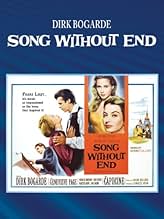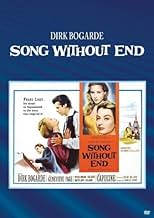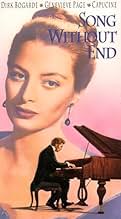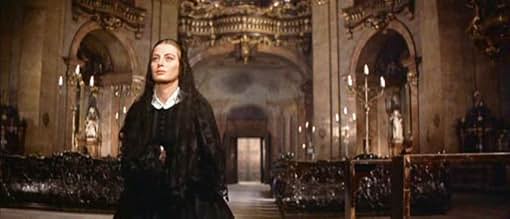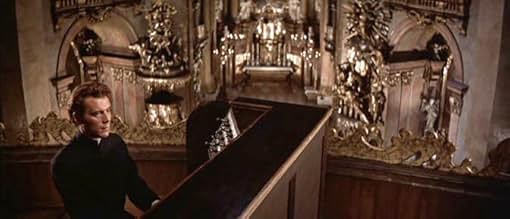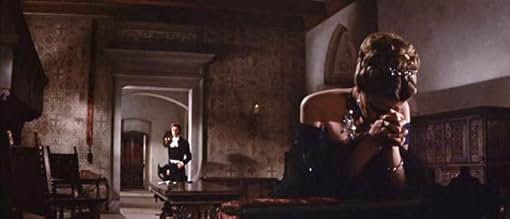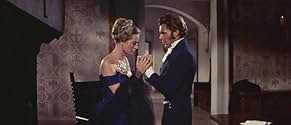The romantic story of Hungarian pianist Franz Liszt (Sir Dirk Bogarde), whose scandalous love affair forced him to abandon his adoring audiences.The romantic story of Hungarian pianist Franz Liszt (Sir Dirk Bogarde), whose scandalous love affair forced him to abandon his adoring audiences.The romantic story of Hungarian pianist Franz Liszt (Sir Dirk Bogarde), whose scandalous love affair forced him to abandon his adoring audiences.
- Directors
- Writers
- Stars
- Won 1 Oscar
- 2 wins & 3 nominations total
- Thalberg
- (as E. Erlandsen)
- Chopin
- (as Alex Davion)
- Emissary
- (scenes deleted)
- Audience Member
- (uncredited)
- Komparsenrolle
- (uncredited)
- Directors
- Writers
- All cast & crew
- Production, box office & more at IMDbPro
Featured reviews
I thrilled to the bombast and impossible fingerwork of Hungarian Rhapsody No. 2. But the final piece Liszt (portrayed by Bogarde) played as he retreated to the monastery haunted me throughout my teenage years. Liebestraume No. 3 ("Dreams of Love") can either be a soothing balm or a cutting knife for the lovesick.
Bogarde, who obviously knew his onions about piano playing displayed the exact fingerwork on the proper fields of the keyboard and his body English was totally convincing. Well after all, he was not only an actor but a true artist - an accomplished writer and a painter.
Capuccine, touted as one of the most beautiful women at the time, portrayed the Princess of Witgenstein. But my heart fell for the jilted wife, the Belgian countess portrayed by Genevieve Page whom I found more,"simpatica."
The film only covers part of Liszt's life and concentrates (naturally) on the turmoil in his love affairs, which leads to his attempt to marry the already married Princess Carolyne Wittgenstein; he left his married girlfriend, Countess Marie D'Agoult, the mother of his children for her. (One of his daughters, Cosima, married Richard Wagner, who features in this film.) I disagree with a previous comment complaining about the way Liszt is portrayed. While it's not emphasized, it is obvious that he was a man of great charity, donating many of his fees to various organizations, and playing many benefit concerts. Later on, he concentrated on composing, at which he was very successful. As a performer, Liszt was a bona fide rock star in his day, complete with hysterical fans. He was most certainly attractive to women and religiously conflicted.
Dirk Bogarde does a sensational job as Liszt. This and "The Angel Wore Red" were his only Hollywood films. Even if they had been successful, it's doubtful Bogarde would have stayed in the states, as he probably wouldn't have been cast in the kinds of films he wanted to make and/or the kinds of parts he wanted to play. He makes a very romantic, intense Liszt, and his fingerings are nothing short of amazing. Capucine is good, if a little wooden, as Carolyne. The supporting cast is very good.
The production and costumes are opulent, but they are dwarfed by the music. Definitely some of the most brilliantly performed classical music in film.
Highly recommended for classical music lovers.
The set decorations here are phenomenal, they're on par with the great 1944 film "Wilson."
The music is magnificent although we could have done without knowing about the friendship between Liszt and the anti-Semite Richard Wagner. Another flaw is the miscasting of Lou Jacobi as Bogarde's manager. Jacobi sounded like he came out of the Catskills. This film for Jacobi came after his super performance, the year before, in the beloved "The Diary of Anne Frank." (Happy Birthday Lou as you turn 95 on Dec. 28th.)
The first part of the film deals with Liszt's career. His playing in concerts in various European countries was remarkable. The second part deals with his ill-fated love with the Countess Cathryne of Lichtenstein.
While we see that Liszt entered the priesthood when his proposed marriage to Cathryne was rejected, we really can't tell if Cathryne became a nun. I imagine no since she was still technically married in the eyes of the church. Nonetheless, we have a powerful, beautifully acted film. Too bad that Totentanz, a Liszt masterpiece, was not played here. I had to know that piece of grand music in a required music course at college. Like the movie, Totentanz was a masterful piece.
What the movie is, which will polarize viewers, is a thorough opportunity to experience music by great composers as they might in the mid-1800s. No less than 40 musical interludes occur, and unlike today's music biopics, these are not small moments, they nearly all play uninterrupted! This makes for a bloated runtime well over 2 hours, but a rare immersive opportunity to sit and listen to an actor portraying a master performer/composer as a recreation of their era. Read the reviews on IMDb and you'll see viewers either hate this or love this depending on their passion for the music itself. And the movie feels to be 70% concerts, which makes an inevitably weary experience that sacrifices a more deft plot.
Peculiarly, the movie features startlingly low percentage music by Liszt himself. It is a well done plot point that Liszt was a champion of his peers, and helped Chopin, Wagner, and others reach fame they wouldn't have without a master performer like Liszt showcasing their work. But this is intentional to the story. The finest example is a scene where Liszt is playing Chopin on the piano in the background, while Chopin's lover and Liszt's lover discuss their merits as composers vs. performers in the front of the scene. Cinematic subtext to perfection. The Liszt inner debate of whether he was a superior composer or performer is a major plot point. I love these components of the plot, for they shed light on who Liszt was in a way that a Wikipedia article never could. And yet, they're overshadowed by the main draw.
The main story is about Liszt's multiple lovers and the challenging decisions that come with this. It's 1960, so discussion of love, sex, and marriage is very reserved. Only 15 years later, Lisztomania has Roger Daltery playing Liszt as a sex-fueled rocker; this one makes his romances a true conflict of faith. It's great material, but definitely dated in its more calm approach.
Director Charles Vidor died early into production, and was replaced by legendary director George Cukor, who it appears was determined to stay within Vidor's vision of a music biography. The result is something slightly authorless: it's a grand period epic, with little outstanding choices, give or a take a few cool shots. If this were released today, it would get roasted for being thin on story and heavy on music sequences without enough subtext behind them.
The film is shot in Cinemascope but the DVD version I have is shoddy at best. This is a perfect example of an old movie that may get forgotten by time and will not get the 4K restoration reserved for classics such as Gone With the Wind, or Criterion essentials of the highest caliber. Makes you wonder what movies will disappear in time. Had I not been studying the work of Chopin & Liszt, I would have never watched this, especially given it wasn't well reviewed to begin with. And yet, despite its flaws, there is plenty to glean from it, mostly for classical piano buffs, but perhaps for others as well.
(Side note: I do wish I could access a list of all the names of the pieces, they don't always make an effort to tell you what is what. It isn't mentioned in the film, though I learned in my own research, that Liszt's championing of Beethoven, the equivalent of a celebrity endorsing an under-appreciated artist today, is what has elevated Beethoven to superstardom. That could be a movie in of itself)
Did you know
- TriviaCharles Vidor had completed about 15 percent of this movie when he died of a heart attack on June 4, 1959. Sir Dirk Bogarde later recalled that he was "secretly relieved" by Vidor's death, since he and his co-star, Capucine had been treated badly by the short-tempered director. Vidor would often scream at Capucine to relax, and at one point, Bogarde recalled, "shook her like a dead cat." Vidor was replaced by George Cukor, who got along much better with his stars, and was more of an "actor's director."
- GoofsGrand Duchess make reference to "Ukraine" in one scene. The term was not in wide use in the 1840s, especially not among Russian nobility.
- Quotes
Countess Marie: I met Franz at a musical party. I remember he played a ballade in A-flat major by Chopin. I thought I'd never seen anything as beautiful as Franz looked when he sat at the piano. I... I wanted to cry. He watched me as he played; Franz never fails to notice a pretty woman in his audience. Afterward, he followed me into the hall. I remember he said, "May I escort you somewhere, madame?" And I said, "Yes." And he said, "Where?" And I said, "Paradise." He didn't smile - he said, "I'll call a carriage."
Princess Carolyne: Did he?
Countess Marie: What?
Princess Carolyne: Drive you there - to paradise?
Countess Marie: [a pause, and a meaningful look as she turns to leave the room] He doesn't know the road, madame.
- ConnectionsFeatured in Film Profile: Dirk Bogarde (1961)
- How long is Song Without End?Powered by Alexa
Details
- Runtime2 hours 21 minutes
- Aspect ratio
- 2.35 : 1
Contribute to this page



